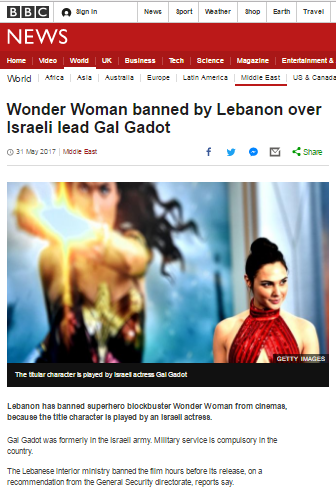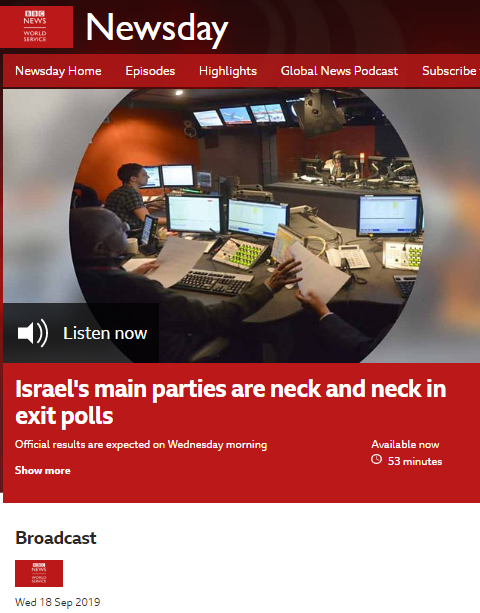On the evening of May 31st an article titled “Wonder Woman banned by Lebanon over Israeli lead Gal Gadot” appeared on the BBC News website’s Middle East and Entertainment & Arts pages.
The report opens:
“Lebanon has banned superhero blockbuster Wonder Woman from cinemas, because the title character is played by an Israeli actress.
Gal Gadot was formerly in the Israeli army. Military service is compulsory in the country.
The Lebanese interior ministry banned the film hours before its release, on a recommendation from the General Security directorate, reports say. […]
A formal request to ban Wonder Woman was first made by the Ministry of Economy and Trade, which oversees a long-standing policy of boycotting Israeli exports, which it considers “enemy attempts to infiltrate our markets”.”
Why Gal Gadot’s military service over a decade ago is relevant to the story is only clear if one is aware of background that the BBC chose to omit. Like many other media outlets, the Guardian explains that:
“Though Wonder Woman had passed the country’s normal screening procedures, the Campaign to Boycott Supporters of Israel-Lebanon put pressure on the government to block the film, describing it as “the Israeli Soldier film”.”
The BBC, however, did not inform its audiences of the part played by that Lebanese BDS group in lobbying against the film. The group – founded, among others, by a Hizballah sympathiser named Samah Idriss – last year received financial sponsorship for a BDS event from Hizballah linked media organs.
Misspelling the name of the lead actress, the BBC’s article tells readers that:

However, as also noted by the Guardian, the same BDS group had also campaigned – unsuccessfully – against the screening of that film in Lebanon. Coincidentally or not, the Ministry of Economy and Trade is currently headed by a minster from a party – FPM – that is part of the March 8 Alliance that includes Hizballah.
The BBC’s report closes as follows:

In addition to the fact that the BBC does not bother to explain that the 2006 war was started by Hizballah when it carried out a cross-border raid and fired missiles at Israeli towns, it also does not clarify that the “ceasefire” that ended the war is in fact UNSC resolution 1701. The parts of that resolution relating to the disarming of militias, the ban on presence of militias in southern Lebanon and the ban on supplies of arms to such militias have definitely not “largely been observed”.
The BBC’s claim that there have been “occasional border clashes between the two countries” – which includes a link to a problematic BBC report from 2015 – is inaccurate. In fact those incidents have not been “between the two countries” at all, but rather were sparked by attacks perpetrated by Hizballah and other terror groups.
The claim that “Israel has targeted Hizballah with strikes in Syria” does not clarify to readers that those alleged strikes have targeted weapons supplies to Hizballah that breach the terms of UNSC resolution 1701. Unfortunately for BBC audiences trying to understand the issue, that omission has become a regular feature of BBC reporting.
Related Articles:
Reviewing BBC reporting of Hizballah’s violations of UNSC Resolution 1701
BBC’s Connolly misleads on Lebanese boycott law
Tepid BBC report on Lebanese Olympic team’s bigoted agitprop




